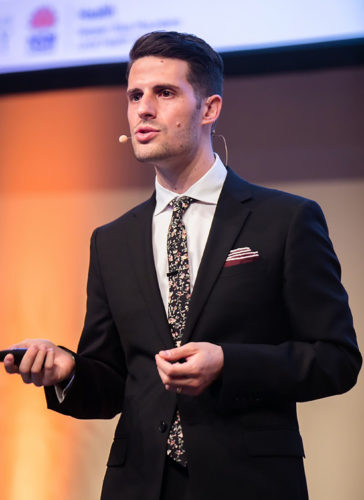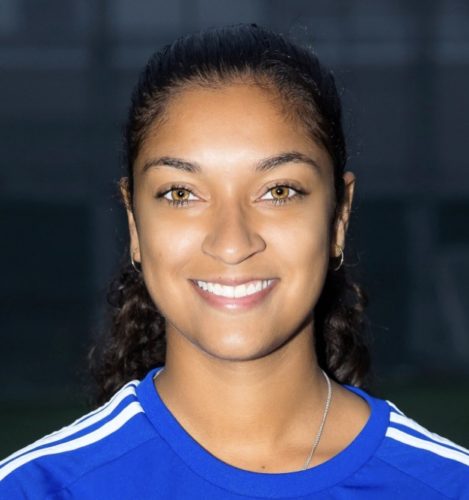Halifax doctor agrees endometriosis should be treated like cancer
New study published in Canadian medical journal says endometriosis patients should be taken more seriously

caption
Photo illustration of someone experiencing endometriosis painJennifer Sheppard never thought she would see herself having to have a hysterectomy at the age of 35.
She was 12 years old when she was told she might have endometriosis, a condition affecting one in 10 women. She was given the choice to start birth control but at the time her father said no.
“He just didn’t understand,” she said.
Over the years the speculation grew, and in 2008 she had her first surgery, an abdominal laparoscopy. This is a procedure that requires cutting small incisions in the abdomen and pelvis with a camera. The doctor actually diagnosed her with endometriosis, but never told her, until she found out from another doctor 10 years later. The diagnosis was mentioned in a footnote of the 2008 surgical report. Related stories
“I had zero quality of life,” Sheppard recalled.
Ten years later, Sheppard lost her business due to the severity of her pain. She made an appointment with a local doctor in Cape Breton.
“I said to them ‘Either I am pregnant or I have a tumor,’” she said.
After an ultrasound, she was told for the first time she had endometriosis and cancer.
The World Endometriosis Society (WES) website describes it as “a condition in which tissue similar to the lining inside the uterus (called “the endometrium”), is found outside the uterus, where it induces a chronic inflammatory reaction that may result in scar tissue.”
WES states that symptoms of this condition include “painful periods, painful ovulation, pain during or after sexual intercourse, heavy bleeding, chronic pelvic pain, fatigue, and infertility.”
In 2018, Sheppard had surgery to remove an endometrioma, a cyst that forms on the ovary due to endometriosis. According to the WES, these cysts are not cancerous and can be found in 17 to 44 per cent of endometriosis patients and can create infertility.
Dr. Elizabeth Randle, a Halifax gynecologist, performed two of Sheppard’s surgeries. Randle said the wait time to meet with a gynecologist in Halifax is about nine months.
Sheppard thought all her problems were solved until she found herself in the operating room only six month later. She had hydrosalpinx, a blockage in the fallopian tube. She had the tube removed.
“I was a rapid regrower, so basically all of the adhesions and endometriosis that Dr. Randle removed was back,” she said.
She said she felt no relief.
‘I couldn’t do this anymore’
She said she and her husband tried to preserve her fertility as they had no children, but last month, she found herself back in the doctor’s office in Cape Breton.
“I told her I couldn’t do this anymore, so I had a radical hysterectomy at age 35,” she said.
Last month, an article was published in The Journal of Obstetricians and Gynaecologists of Canada (JOGC) by Dr. Mathew Leonardi, a gynecologist currently practicing in Australia. He said that endometriosis patients should experience the same care as a patient with gynecological cancer.
“We, as a medical system, are failing people with endometriosis,” Leonardi said in the article.
Leonardi said since endometriosis is non-cancerous, it has gone “under the radar” and has not required a gynecological specialist. He said the medical system should create an integrated multidisciplinary program to help those with endometriosis. The program would include: pain specialists, psychologists, physiotherapists and other specialities to help endometriosis patients.
He said “until endometriosis care is considered as high a priority as gynecological oncology management and this care predominantly takes place in centres of expertise…we will continue to fail our patients.”
Randle agrees. She said treating endometriosis patients as a more complex issue like cancer would work more effectively.
“I would 100 per cent agree that endometriosis patients will find better outcomes when treated with multidisciplinary expertise,” she said.

caption
Dr. Mathew Leonardi is a gynecologist currently working in Australia.Randle said endometriosis is a form of chronic pain and is not always seen as an urgent matter. She also said Nova Scotia currently does not have multidisciplinary programs for pelvic pain. There are only chronic pain clinics that cater to a variety of pain patients. This results in very long wait times.
Randle said she and Dr. Allana Munro, an anesthetist, received a Translating Research Into Care (TRIC) grant from the IWK Foundation to look into an integrated multidisciplinary program for chronic pelvic pain patients at the IWK Health Centre.
They hope to supply a program that will integrate gynecologic management and chronic pelvic pain from an anesthesia, physiotherapy and psychological standpoints.
In a Twitter message to The Signal regarding his recent journal article, Leonardi said “The response has been outstanding. There was such a demand to read the full article from people on social media and ResearchGate that JOGC made the article free access.”
He said there are two things that need to happen in order for places to make this change in management. First, there needs to be more training for the managing of endometriosis and other complex gynecological problems. Second, those without specific training and skill need to learn “it is better for the patient if the patient is referred to someone with expertise.”
“Regular residency training may be okay to manage some patients with endometriosis, but it is not enough for a lot of patients,” he said. “Our traditionally taught clinical and diagnostic tools are inadequate to aid gynecologists in determining whether a patient is actually an appropriate patient for them to treat.”
Sheppard said her hysterectomy was life changing, and for the first time in 23 years she has been without pain. She said she was aware of Leonardi’s article and had heard about it in passing.
“I think he is exactly right,” she said.
About the author

Lesli Tathum
Lesli is from the Cayman Islands. She is in her fourth year of journalism at the University of King's College and is a member of the King's Women's...
H
HD
H
HD
H
H
A
AA
A
Aoife
A
Aoife
E
Emily Blayney